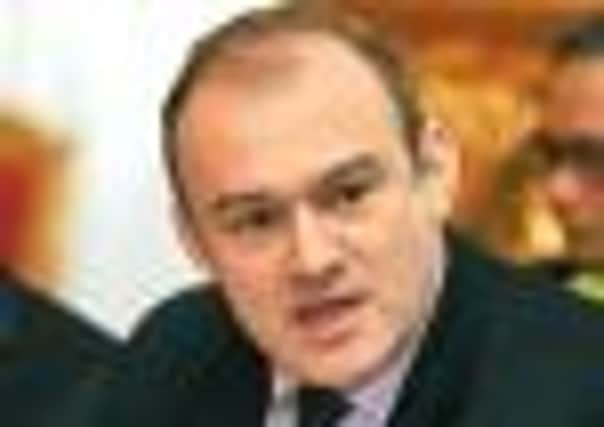Independent Scotland ‘would see energy bills increase significantly’


Speaking at a Scotsman Conference on energy in an independent Scotland yesterday, Mr Davey claimed subsidies which are currently borne by 26 million households across the UK could instead be shared among Scotland’s 2.5 million homes.
He warned that would mean a “significant” increase in household bills.
Advertisement
Hide AdAdvertisement
Hide AdBut his claims were rejected at the conference by SNP energy minister Fergus Ewing who
accused the UK government ministers of rushing to Scotland like an “abstentee landlord” fearing that Scotland, with its rich oil and renewables reserves, was set to leave the UK.
Mr Ewing said UK ministers would end up accepting a continuation of the current single energy market across the UK after independence, on the grounds that, without Scottish energy feeding into the national grid, the “lights would go out” on England.
However, Mr Davey’s claim was then backed by a leading academic at the conference, former World Bank economist Professor Gordon Hughes, who described Mr Ewing’s claim that England would need Scotland’s energy riches after independence as
“exaggerated”.
The conference on energy came after E.on became the last of the “big six” energy suppliers to put up its bills from early 2013, with a move to boost prices by more than £100 a year.
Prices are to rise by between 6 per cent and 10 per cent, with the companies blaming both the rising wholesale market and the cost of cutting the nation’s carbon emissions through a shift to green energy.
All companies are required to buy a certain amount of their electricity from renewable sources, with the extra costs then diverted as the main support mechanism for renewable energy projects.
With Scotland playing host to a disproportionately large share of renewable projects across Britain, Whitehall ministers argue that it benefits from a UK-wide system which means all households pay for those subsidies.
Advertisement
Hide AdAdvertisement
Hide AdMr Davey said: “We will be working up a number of papers looking at the benefits of Scotland in the UK and showing how Scotland benefits from being in the UK,” he said. “It will show the benefits of being able to support the costs across
26 million households.”
Asked whether the costs would rise if Scotland became independent, he said: “It is logical that bills will go up and we are talking about a significant amount.”
After independence, he added “England, Wales and Northern Ireland will be faced with a question about where they buy their energy from”.
He said “there are other options” apart from Scotland. “I am afraid that the idea there is only one place that England, Wales and Northern Ireland would go is simply not the case,” he added.
In the meantime, however, he said he wanted to “champion” Scottish renewable energy, insisting it had a “fantastic” future.
However, those claims were hotly contested by Mr Ewing who claimed that there would be a “mutual need” between England and Scotland after independence which would lead to the retention of the current single energy market, with the cost or renewable subsidies spread evenly through the UK.
He said: “The UK needs Scottish energy. Scotland can and will guarantee electricity to keep the lights on. We don’t want our good friends in England to be physically in the dark”.
He added the SNP would lobby hard for an integrated British market, claiming new legislation enshrined in Mr Davey’s new energy bill had already set out “in principle” that energy contracts could apply to “support generation that is located outside the UK”.
Advertisement
Hide AdAdvertisement
Hide AdMr Ewing’s comments follow a speech by First Minister Alex Salmond in September in which he said Scotland and the rest of the UK’s energy sector would “continue in a shared marketplace”.
Speaking later, however, Prof Hughes said England could either produce more home-grown renewable energy – especially by converting coal fired stations to biomass – or could opt, after Scottish independence, to renegotiate its target to produce 20 per cent of all its energy from renewable sources by 2020.
Another speaker, David Wilson, the director of Energy and Climate Change at the Scottish Government, insisted however that a UK-wide system would work after independence.
He said: “We feel the scope for interdependence and cross border jurisdiction to really work is very considerable.”
“Meanwhile, Richard Yamm of Pelamis Wind Power told the conference that clear-headed decisions would be required over the independence issue. “We need to consider independence very carefully,” he said. “There is no place for emotional debate. We need to see a proper debate, not on ideology but on reality.”